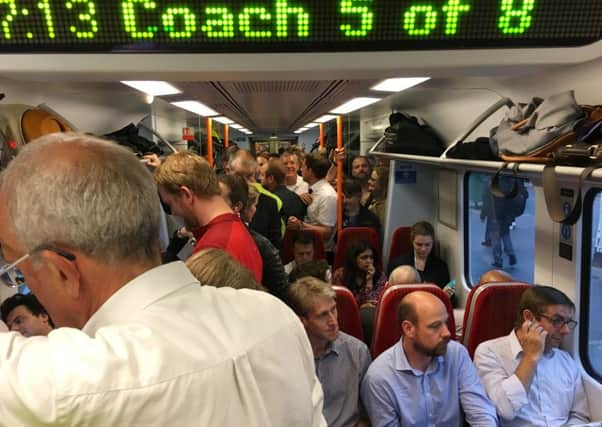Bernard Ingham: Return trip to the bad old days if we don't ban strikes


We ageing pensioners are spared the lot of the modern traveller subject to the whims of the rail unions. But we know what trials they impose on our family and friends.
We are not, however, immune to the handiwork of public sector unions. The junior doctors’ strike after their refusal to work normally caused anxiety, depression and possible damage to altogether too many old folk among the thousands of NHS patients affected by the postponement of consultations and operations.
Advertisement
Hide AdAdvertisement
Hide AdAnd now they are threatening through the BMA to have more strikes if they cannot settle their dispute with the Government. To cap it all, their placards stress that they are a profession.
They seem to be blissfully unaware that membership of a profession is nothing to write home about these days in view of the activities of members of the legal, accountancy and financial sectors.
Against this background, I have reached the conclusion that these trigger-happy unions must be prevented from using the population as a pawn in their games with employers. In short, they must be stopped from striking by law and their immunity from prosecution ended.
They don’t threaten to gum up Eurostar on the August bank holiday just for fun. They don’t make misery for millions of commuters in the South for the sheer hell of it. Nor do they threaten to halt Virgin’s East Coast line through Yorkshire to Scotland to relieve the monotony of life on the modern electrified footplate.
Advertisement
Hide AdAdvertisement
Hide AdNo, they are cold-bloodedly out for themselves – with a certain insouciance on the photographic evidence of two RMT officials on holiday in Turkey holding up a vulgar sign to the travellers back home.
With hypocritical protestations that their argument is not with the public, they seek, as ever, to use the inconvenience of travellers and the economic damage of their interference with services to put pressure on the Government to engineer a capitulation to their demands. They are playing politics.
The current wave of Denis Thatcher’s “buggeration factor” is not directly for money but over staffing changes (Virgin East Coast) which the company says have no implications for safety or compulsory redundancy; over the role of conductors on Southern (again no safety implications); and – to take the biscuit – over a “good work-life balance” for Eurostar staff.
It is probably safe to say that the RMT, with Jeremy Corbyn’s support, is not alone among railway unions in reducing economic output far more than Brexit was ever likely to achieve.
Advertisement
Hide AdAdvertisement
Hide AdAnd to think that Corbyn and his rival for the Labour leadership, Owen Smith, would renationalise the railways. That would ensure that the public are automatically used to hold the Government to ransom as during the 1960s and 1970s. It is, frankly, a conspiracy to use public funds against the public’s interest in reliable railways.
Meanwhile, London Underground drivers earn more than double the junior doctors’ starting salary of £22,000 by the simple expedient of imposing stress and uncertainty on commuters. Their wages were not achieved by the professionalism that has brought respect and a comfortable salary for fully qualified doctors.
So that you know where I am coming from, I was brought up in a weavers’ trade union home. In the 1960s I was deputy father of the NUJ chapel on this newspaper and then the Guardian.
I worked as press secretary in the strikes department – Employment – for five years up to 1973, covering both Barbara Castle’s “In Place of Strife” White Paper to try to complement union power with responsibility and Robert Carr’s ill-fated Industrial Relations Act.
Advertisement
Hide AdAdvertisement
Hide AdThen I went to the Department of Energy in the middle of an oil, coal and political crisis and my 11 years with Margaret Thatcher encompassed the Miners’ Strike.
I do not in any way excuse public sector management, especially on the railways and in the NHS. It leaves much to be desired.
But the rail unions’ co-ordination of strikes this summer, deliberately targeting workers and holiday makers, deserves a public response.
As an old campaigner for constructive trade unionism, I fear that industrial relations legislation in the 1980s and since has not been effective in protecting the public. We must quite simply ban strikes – indeed all industrial action – in the public sector and find a better way of settling its disputes.
Travellers might then get a better “work-life balance”, too.